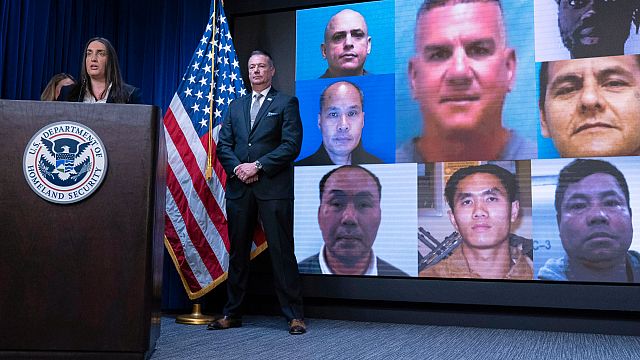Republican Crackdown on Aid to Immigrants Would Hit U.S. Citizens


President Trump has vowed to end what he calls the “waste of hard-earned taxpayer resources” by cutting off federal benefits for undocumented immigrants and ensuring that funding goes to American citizens in need.
Administration officials have said they would root out “illegal aliens” who are living in federally-subsidized housing. The Agriculture Department has ordered states to enhance immigration verification practices used to determine eligibility for food stamps. And House Republicans just passed a tax bill that would limit certain immigrants from accessing Medicaid and Medicare, a popular tax credit for parents, and federal financial aid, among other benefits.
The actions amount to an aggressive attempt to curb immigrant families’ use of safety net programs. Although Republicans say they want to remove incentives for people to enter the country illegally, unauthorized immigrants generally do not receive federal benefits given efforts to chip away at their eligibility.
Immigration experts and advocates for immigrant rights say the changes would instead largely be felt by children who are U.S. citizens but whose parents are undocumented or immigrants who are authorized to live in the United States, such as refugees and people granted asylum.
Twelve percent of American children, or about nine million people, are citizens with at least one noncitizen parent. Children with at least one immigrant parent are twice as likely to live in poverty than those with native-born parents, according to a 2022 report by researchers at the Boston University School of Social Work.
“In the name of wanting to take a harsh policy stance against immigrants, in many different ways the reality is that they’re going to be punishing citizens and other immigrants that have been eligible in the past,” said Shelby Gonzales, the vice president for immigration policy at the Center on Budget and Policy Priorities, a left-leaning think tank.
Some of the most substantial changes would come with the tax bill, a centerpiece of Mr. Trump’s economic agenda that House Republicans narrowly passed on Thursday. If approved by the Senate, the package would boost the child tax credit to as much as $2,500, but limit its availability to parents with Social Security numbers.
Current law allows children who have Social Security numbers to receive the benefit, even if their parents have only individual taxpayer identification numbers, which are issued to noncitizens for the purpose of paying taxes.
The change would make roughly two million children with Social Security numbers no longer eligible for the benefit, according to an estimate from the Joint Committee on Taxation.
Some proponents of the change argue that the child tax credit currently allows undocumented immigrants to benefit from taxpayer money, and that such funding should be shut off even if their children are citizens.
“In the real world, the money is going to the unlawful alien parents, and they’re not obligated to spend that money on the children,” said George Fishman, a senior legal fellow at the Center for Immigration Studies, a think tank that favors restricting immigration.
Others said the potential changes would undermine the well-being of children who are U.S. citizens in immigrant households. Families where someone doesn’t have a Social Security number are already ineligible for the earned-income tax credit, which provides a significant boost to low-income households. Research has found that children who receive similar cash benefits go on to have better health, earn more and commit fewer crimes later in life.
“Going forward, they are the adults of this country,” said Dolores Acevedo-Garcia, a professor of social work at Boston University who studies immigrants. “Do we want to disinvest in them now so that their education and health and everything deteriorates, and then we have to face that in a few years from now?”
The tax bill would also tighten eligibility for federal health insurance programs. Immigrants who are authorized to live in the United States but are not legal permanent residents would no longer qualify for Medicare unless they fall under certain exceptions. The package would also bar those immigrants from receiving subsidized health insurance on marketplaces set up by the Affordable Care Act. Those changes could affect refugees, immigrants granted asylumand people with temporary protected status. It would also deny access to marketplace plans entirely for people brought to the United States as children who are currently protected under the Deferred Action for Childhood Arrivals policy.
Some of those immigrants have a path to obtaining a green card, but not all of them do, such as foreigners granted immigration parole or temporary protected status.
The tax plan would also trim Medicaid expansion funding by 10 percentage points for states that use their own money to cover low-income undocumented immigrants, which could penalize 14 states that provide health coverage to children regardless of immigration status, according to KFF, a health policy research group.
States could choose to stop covering undocumented immigrants, and preserve their federal matching funds. Or they could keep that coverage and take the hit to their federal reimbursement, which would mean less money to go around for U.S. citizens who depend on Medicaid. Research has also found that people who don’t have health insurance are more likely to rely on emergency rooms for preventable care. Hospitals must provide emergency care regardless of a patient’s immigration status, which they can receive reimbursements for through emergency Medicaid.
“So they’re going to need to look to other programs, or just cut the funding for undocumented immigrants, which is going to have an impact on everyone in that family, including citizen family members,” said Wendy Cervantes, the director of immigration at the Center for Law and Social Policy.
The bill would also end a requirement for states to provide Medicaid benefits to applicants during a grace period in which their immigration or citizenship status is being verified, which could deny coverage to those who don’t have easy access to documents like a passport or birth certificate.
And the tax bill would cut off federal tuition assistance and food stamps for nearly all immigrants who are not citizens or permanent residents.
Alex Nowrasteh, the vice president for economic and social policy studies at the Cato Institute, a libertarian think tank, said he supported efforts to curtail immigrants’ access to federal benefits. But he said the changes would not result in major budget savings, given that noncitizens receive just 3.5 percent of all welfare and entitlements.
“The budget deficit cannot be plugged by kicking noncitizens off welfare benefits,” Mr. Nowrasteh said. “That being said, they should be removed because a dollar saved is a dollar saved, and that’s good enough. I’d much rather they kick immigrants off welfare than kick immigrants out of the country.”
Although the tax bill is still working its way through Congress, many federal agencies are already trying to restrict undocumented immigrants from accessing programs. In March, the Housing and Urban Development Department said it would partner with the Homeland Security Department to ensure that federal housing programs were not benefiting undocumented immigrants over citizens. The Small Business Administration has barred lending to companies with any amount of investment from people without Social Security numbers, constraining credit for American-born entrepreneurs.
Many housing authority directors and housing policy experts expect the Trump administration to propose a rule that would ban families with any undocumented members from subsidized housing, even if their children are U.S. citizens and eligible for the benefit. The administration proposed a similar rule during Mr. Trump’s first term but did not put it in place. The housing department found at the time that doing so could displace 55,000 children who were in the country legally, and that more than 108,000 people receiving assistance lived in a household with at least one undocumented member.
“Children in immigrant families, who are often U.S. citizens, would be harmed both by the threat of family separation and the risk that they may become homeless,” said Tanya Broder, a senior counsel at the National Immigration Law Center.
Other agencies that run benefit programs have reiterated that undocumented immigrants are not permitted to receive funding. The Labor Department sent a letter to states last month warning that they could lose federal funds if they allowed unauthorized immigrants to receive unemployment benefits. The Social Security Administration also expressed its “full support” for Mr. Trump’s efforts to ensure that undocumented immigrants did not receive Social Security benefits.
The Trump administration has also put pressure on Democratic states that aid undocumented immigrants, including starting an investigation into a California program that has provided cash assistance to some undocumented immigrants and revoking waivers to state colleges and universities that use federal money to provide some services to unauthorized immigrants.
The effort to target immigrants could create a chilling effect, making people hesitant to enroll for benefits over fears that their family members could be deported if they share their information with the government, said Valerie Lacarte, a senior policy analyst at the Migration Policy Institute.
“Even if you’re eligible and you can get those benefits, you’re also letting the state or agency know that there’s an unauthorized immigrant in your household,” Ms. Lacarte said. “The rhetoric essentially discourages people from using public benefits.”
What's Your Reaction?
 Like
0
Like
0
 Dislike
0
Dislike
0
 Love
0
Love
0
 Funny
0
Funny
0
 Angry
0
Angry
0
 Sad
0
Sad
0
 Wow
0
Wow
0









































